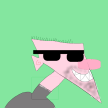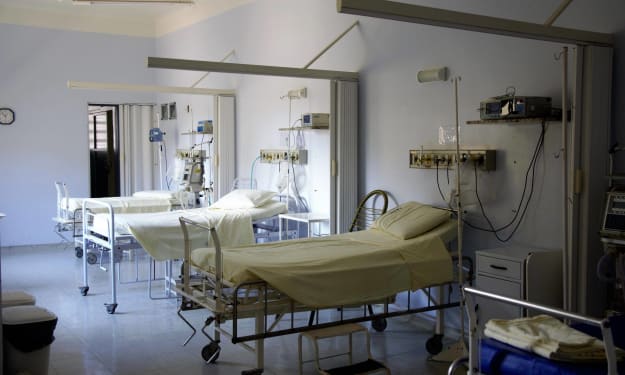Fake Names
When your father keeps fake IDs, how do you know his real name?

My father kept a drawerful of fake IDs. I remember finding them one day when I was a kid, seeing my father’s face next to so many different names. Always the same stern expression.
When I asked him, he brushed it off as a hobby he’d grown out of. I forgot all about the IDs, especially since he was at work most of the time.
Wandering through my empty childhood home, the memory of all those different names comes back strong. Lured on, I head into my parents’ old room, now dustier and duller than I remember. The once vibrant wallpaper is peeling back at the corners, and damp has seeped into the ceiling.
My cousins, aunts, uncles, etcetera will arrive soon to pilfer what they want from the place. I swallow my grief, pulling open the drawer.
I stare down at the mess of passports and driving licenses. Again, the same photo against different names. Brushing through them, I pause, uncovering a photo tucked under one of the IDs. With shaking hands, I exhume it from the drawer.
There’s my dad, his arm around a woman I don’t recognise. She cradles a baby, who peers out with big eyes at the camera, and he has his other hand on the shoulder of a gangling teenage boy. They all look so happy.
My throat becomes stuck as tears sting my eyes. The other family dissolves in my haze of despair, and I crumple the photo into my pocket.
Did my mother know? Did everyone except me know? All the fake IDs, the lies, the time away.
My mind flashes to an early Christmas. My mum was giddy about my dad finally returning home after months away. We spoke to him on the phone before he boarded his plane, and I stayed up all night, waiting for the click of the key in the front door.
And when Christmas Day came, I heard my mother’s dejected sigh as she pulled herself out of bed. I tried to cheer her up, beaming at my presents. But inside I felt as hollow as her smile. Still, we welcomed him back warmly when he did return in January.
Well, he must’ve decided his other family would be more fun at Christmas. Scrubbing at my eyes, I march from my childhood home. I can’t stay another moment. Let the cousins and the rest take what they want.
It’s only when I settle myself at a table in the local café, espresso steaming before me, I pull the photo from my pocket, smoothing it out as best I can. Outside, a gale howls and peppers globs of rain against the glass. In the photo, the sun is clearly shining, and the house behind the family stands in idyllic mockery of the rundown home I grew up in.
I scan my father’s face for some sign of regret or shame. There’s just the same easy happiness – so different from the sternness he showed on all his IDs.
Sighing, I turn the photo over and pause, cup inches from my lips. I pull out my phone, tapping in the address written on the back of the photo. A farm pops up on the map, just outside of town.
Time blurs by with my decision, and I find myself on the road towards the farm. It’s the right thing to do. After all, perhaps they don’t know my dad’s dead. I admit to myself though, I’m steered mostly by morbid curiosity.
I want to hate the family I find at the end of this road. I want to hate them because I can’t bring myself to hate my father.
I have to pull over twice to compose myself, as more memories resurface. All the times my father was gone, all the times he promised he’d be with us. Now I know why he wasn’t.
Eventually, I come to the farm. I stop the car and walk down a long muddy road, mindless of the dirt splashing up my ankles. It’s a beautiful place.
Sighing, I step up onto the porch of the beautiful house from the photo, and knock at the door. Laughter emanates from inside. A few agonising moments later a silhouette appears. The door opens, a gangling young man in its place to offer a polite but uncertain smile. I must look insane, I realise, mud up to my knees, drenched from the rain, hair windblown.
“Mum!” he calls.
His mother ushers him out of the way, giving me a beaming smile with the same measured uncertainty. I gulp down my fear, pulling the photo from my pocket. She flinches at my movement.
“Do you know this man?” I say, voice breaking.
She squints at the photo, then at me, suspicious. “How did you…”
“This man is my father,” I croak. “All… All along he had another family…”
The woman on the other side of the door frowns, sagging slightly where she stands. “Oh, my dear…”
Any small amount of hate I’d mustered for her falls away. When she looks at me, there are tears shimmering in her eyes. From beyond her comes more laughter.
“I’m sorry,” I say. “I didn’t mean to intrude.” I start to turn, the world suddenly pulling away from me.
“No, please. We should talk.”
Sighing, I turn to the woman. She takes the photo from me with a wistful smile.
“Your father was a good man,” she says.
I shrug. It’s hard to believe that now. “What did he call himself?”
“Eugene Raskachik,” says the woman, and I feel as if I’ve been punched in the stomach.
“His name was John Gregory,” I say. “He had so many fake names… fake lives.”
The woman stares at me. “He was never here often. His work, you know, took him all over the world.”
But even if he’d only had these two families, why had he chosen to spend more time with this one? Why had he ignored me?
“When was the last time you saw him?” I ask.
The woman sighs, looking down the hallway to where it sounds like a party’s going on. “Years ago. He just left one day, I presumed for work. He didn’t come back, but I… thought he’d died in his duty.” She wiped mascara-dyed tears across her cheek. “Like I say, he wasn’t a big presence in our lives. I gave him that photo to remind him of us when he was overseas.”
I don’t know what to say. She heaves another sigh, fixing me with a sympathetic look.
“I had a husband before,” she says. “He worked with Eugene… with your father in Russia a long time ago. When he got killed, Eugene helped move me here, away from certain people. He stayed here a while to look after me. Then…” She looked to the ground. “I never meant to keep him away from you. I never knew.”
A small girl pops up beside her, tugging at her arm. “Nana, you need to get the cake ready.”
The woman waves her away then stands facing me. I can’t hold the truth back any longer.
“Whatever his name really was, he died about a week ago.” My voice cracks only slightly. “My mum’s in a care home already, so I went to clear out the house. I found the photo.”
The woman gives another heavy sigh, leaning against the doorframe. After a time, she turns to me, a sad smile on her lips.
“You do look like him,” she says.
The strangeness of the day comes down on me. I shake my head, feeling trapped in absurdity. With my own weak smile, I admit my exhaustion.
“I should get back home,” I say.
“Well… You know, you can always come and visit.”
I smile again, turning my back on the woman and walking to my car through the mud. Though the rain has stopped, I hurry, throwing open the door and sinking into the seat.
I wonder which family was his real family. Does it matter? I don’t know. I’m not even sure if his real name was John Gregory or Eugene Raskachik. His own grandparents were Russian immigrants, but it occurs to me I never knew for sure what last names the rest of my family had. And maybe his real name was neither, but one of the others on the dozen or so IDs he kept.
In the end though, he was buried with a stone calling him John Gregory, whether it was his name or not. I’ll try to think of him only as my father.
About the Creator
Charlie C.
Attempted writer.






Comments
There are no comments for this story
Be the first to respond and start the conversation.